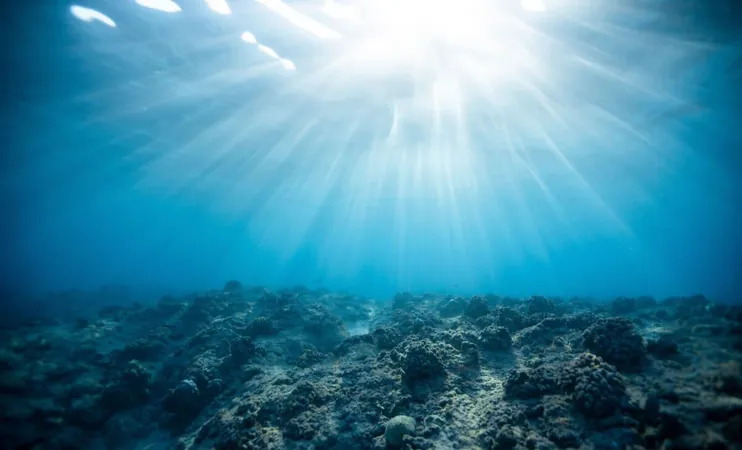
Urgent Warning: Carbon Dioxide Removal Techniques May Endanger Ocean Oxygen Levels!
2025-06-15
Author: Ying
A Wake-Up Call from the Oceans
A groundbreaking study in *Environmental Research Letters* has unveiled alarming insights into certain marine carbon dioxide removal (mCDR) methods and their potential to drastically impact global ocean oxygen levels. Spearheaded by Prof. Dr. Andreas Oschlies from the GEOMAR Helmholtz Center for Ocean Research Kiel, this research underscores the urgent need to rigorously evaluate these techniques, as they may inadvertently worsen ocean deoxygenation.
The Dire State of Ocean Oxygen
In recent decades, our oceans have already lost about 2% of their precious oxygen supply, with the situation deteriorating rapidly due to climate change. This depletion has severe implications for marine ecosystems, as countless species find it increasingly difficult to survive. As temperatures climb, oxygen loss will likely accelerate, leading to catastrophic ecological consequences—yet some proposed climate solutions might actually worsen this critical issue.
Beware the Risks of mCDR Methods!
Marine carbon dioxide removal techniques are heralded as essential tools in combatting climate change, but not all are created equal. According to Prof. Dr. Oschlies and his international team, certain biological methods—including ocean fertilization and extensive macroalgae farming—pose significant risks by increasing oxygen consumption in oceans. Their research reveals a startling reality: what may benefit the climate can simultaneously harm marine life. This is emphasized with a stark warning: "What helps the climate is not automatically good for the ocean."
Biotic Methods: A Double-Edged Sword
The study highlighted that various biotic mCDR approaches—like ocean fertilization—could worsen the ongoing oxygen crisis. As biomass production surges, so does decomposition, lurking as a hidden foe that consumes oxygen. Prof. Dr. Oschlies estimates that the oxygen loss from these processes could surpass the gains from cutting CO2 emissions by a staggering 4 to 40 times! Thus, methods that amplify biomass but also lead to oxygen depletion cannot be dismissed as safe climate solutions.
Could Geochemical Solutions Save Us?
On a more optimistic note, geochemical mCDR methods, such as enhancing ocean alkalinity with limestone-based substances, seem to have less detrimental effects on oxygen levels. These techniques do not contribute nutrients that harm oxygen concentrations. While their scalability and long-term outcomes require further scrutiny, they might present a safer alternative to complex biotic approaches.
The Silver Lining: Macroalgae Farming?
Among the mCDR strategies, large-scale macroalgae farming with biomass harvesting stands out as a potentially positive solution. Unlike other methods that exacerbate oxygen depletion, harvesting macroalgae can actually boost ocean oxygen levels by removing excess nutrients and limiting detrimental oxygen consumption. Exciting simulations suggest this method could restore up to ten times the oxygen lost from climate-related warming over the last century. However, caution is warranted as extensive harvesting could disrupt oceanic productivity, highlighting the importance of assessing its wider environmental consequences.
Navigating the Future of Ocean Health
The findings of this pivotal study serve as a clarion call to rethink our strategies against climate change. As we explore new avenues for carbon dioxide removal, we must ensure our actions don't unwittingly amplify the very challenges we aim to resolve. The delicate balance of ocean ecosystems requires innovative yet responsible methodologies that safeguard their future and ours.






 Brasil (PT)
Brasil (PT)
 Canada (EN)
Canada (EN)
 Chile (ES)
Chile (ES)
 Česko (CS)
Česko (CS)
 대한민국 (KO)
대한민국 (KO)
 España (ES)
España (ES)
 France (FR)
France (FR)
 Hong Kong (EN)
Hong Kong (EN)
 Italia (IT)
Italia (IT)
 日本 (JA)
日本 (JA)
 Magyarország (HU)
Magyarország (HU)
 Norge (NO)
Norge (NO)
 Polska (PL)
Polska (PL)
 Schweiz (DE)
Schweiz (DE)
 Singapore (EN)
Singapore (EN)
 Sverige (SV)
Sverige (SV)
 Suomi (FI)
Suomi (FI)
 Türkiye (TR)
Türkiye (TR)
 الإمارات العربية المتحدة (AR)
الإمارات العربية المتحدة (AR)